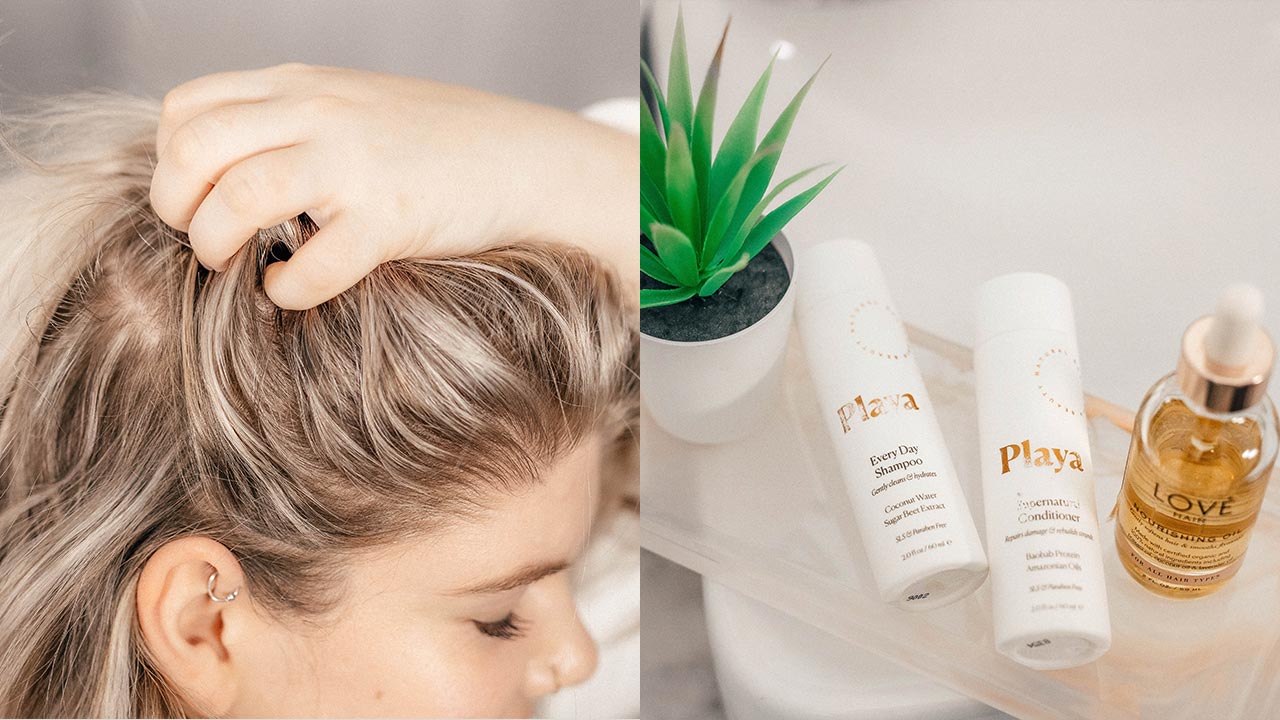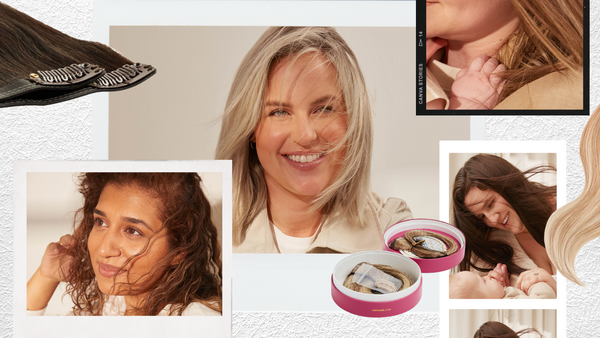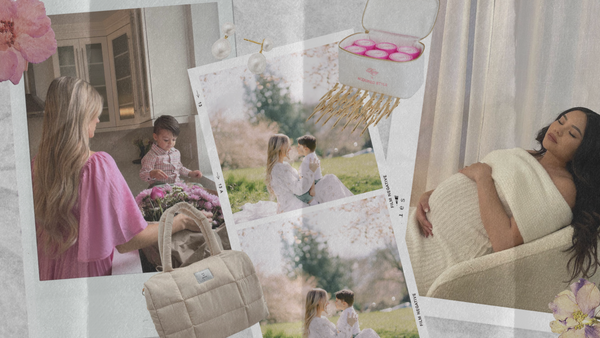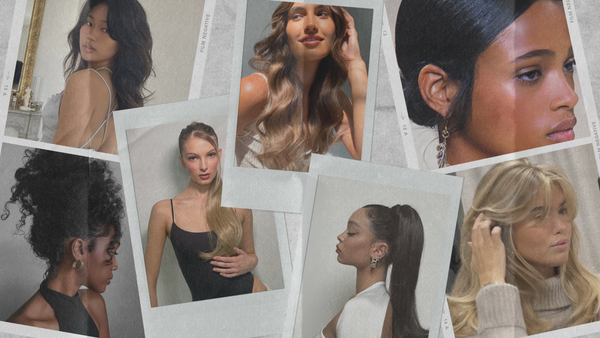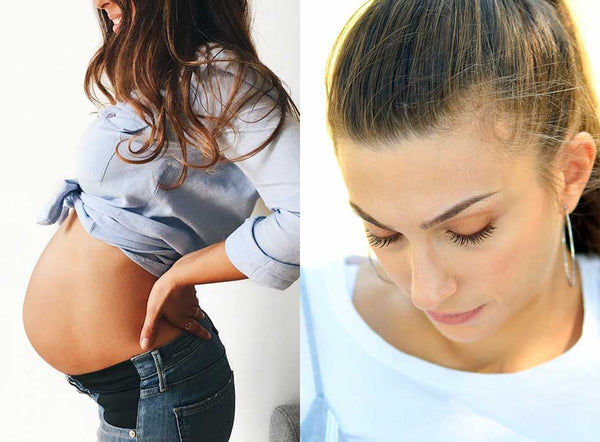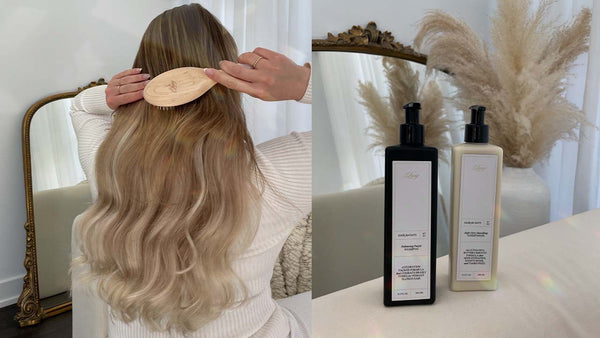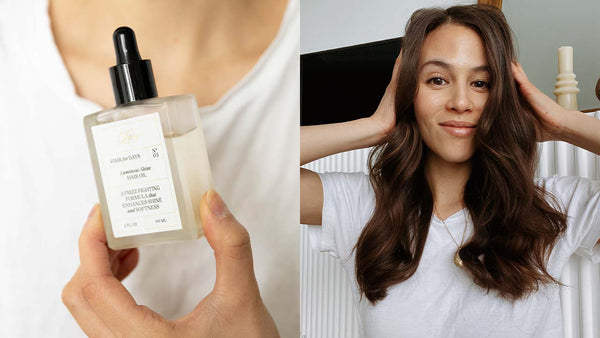A dry scalp is not fun for anyone. It’s uncomfortable, itchy, and can be painful if left untreated. The reality is that no one is exempt from experiencing a dry scalp—it affects women and men alike.
At the onset, a dry scalp typically appears as irritation that leads to flaking of dead skin. It sounds gross, but it’s normal, and fortunately, it can be treated.
Your hair is a part of you and like your skin, it is susceptible to being irritated and damaged. If you prioritize your skincare, you definitely don’t want to underestimate the importance of haircare.

Consider the fact that hair conditions like dry scalp can either be a result of a skin condition (dryness or eczema) or contribute to skin conditions like acne. Dry hair, dry scalp—it’s all a nuisance that can be treated if you just take the time.
Whether you are dealing with your natural hair or hair extensions, it’s important to take care of the hair on your head whether you’ve clipped it on or grown it yourself.
If you’re struggling with how to get rid of your dry scalp, you need to understand what it is, what it involves, what causes it, and your treatment options. You’re not alone, and with some TLC, your dry scalp will get healthy and moisturized in no time.
Hare care just takes some knowledge, education, and patience. We here at Luxy Hair want to give you the resources you need to better understand hair health.
What is Dry Scalp?
According to Medical News Today, dry scalp is a condition that occurs when the scalp produces less moisture or holds less moisture due to a lack of oil.
When your scalp gets dry, it gets irritated. This irritation causes the skin on your scalp to flake off like dandruff, which is why it’s easy to confuse the two.
The Difference between Dandruff and Dry Scalp
Dandruff is a scalp condition that causes dead skin cells to flake off. Although dandruff and dry scalp share many similarities, the two conditions are different and require different treatment:
Causes of dandruff
While dry scalp is largely caused by a lack of moisture and oils on the scalp, dandruff is caused by seborrheic dermatitis. This is a condition that causes the skin of your scalp to turn red, oily and scaly, and results in these scales flaking off (yeah, we know—kind of gross when we put it that way).
It’s also worth mentioning that dry scalp stems from lack of oils, which is a common result of over-washing hair. Dandruff, on the other hand, occurs when there’s too much oil on the scalp — often due to hair not being washed enough. In the end, hair health is about balance.
What is dandruff?
While dry scalp results in small dry flakes of dead skin, dandruff causes oily, large yellow-white flakes.
Remedies for dandruff
Dry scalp can be treated with nourishing substances like oils, apple cider vinegar and special hair products that can help moisturize your scalp. Dandruff, on the other hand, tends to require more medical-based treatments if it is severe.
It is worth mentioning that there are special shampoos and conditioners designed to specially treat both dry scalp and dandruff. At the end of the day, hair health is about recognizing the type of hair you have and finding the right products to keep it healthy and protect it from environmental factors.
Dry Scalp Causes
Dry scalp is a nuisance, but what causes dry scalp to begin with? Next time you are wondering “Why is my scalp so dry?” consider the many ways things can be drying out your scalp.
Dry Skin
According to Medical News Today, it is common for people with dry skin to develop dry scalp.
Harsh Hair Care Ingredients
There are many harsh chemical-based ingredients commonly used in hair products like alcohol that can be drying out your hair. Be sure to use the right hair products that are packed with natural ingredients that are hydrating, nourishing and restorative.
Excessive washing
Dry scalp tends to be caused by excessive washing. The reality is that you shouldn’t be washing your hair every day. People have varying hair types, so it’s up to you to identify how often to wash your type of hair. Overwashing, especially using products with harmful ingredients like alcohol, can be harmful to your hair health.
Skin Conditions
Painful scalp conditions such as seborrhea, seborrheic dermatitis, and eczema can all lead to dry scalp. In some cases, these conditions can be a reaction to ingredients in your products. For example, contact dermatitis is a common reaction to daily hair products like hairspray and gel that can cause your scalp to dry out.
If the root cause of your dry scalp is an underlying skin condition, it’s a good idea to seek professional help. A professional will be able to prescribe medical-grade products that can help subside the condition and, in turn, restore moisture to your scalp.
Cold, Dry Air
Dry air in cooler months like the winter can cause your scalp to dry out.
Older age
As you get older, your skin’s sebaceous glands (that produce oil) become less active — which means you get less natural moisture to your scalp. This is why as you get older it’s essential to use moisturizing products to keep your scalp and hair soft and hydrated.
Allergies
You may be allergic to the ingredients in your hair products and not even realize it. It's common for hair products, especially those with harsh ingredients as mentioned, to cause your scalp to have an allergic reaction.

How to Treat Dry Scalp
The battle of how to get rid of dry scalp is one that can sometimes be won simply by dialing back on hair washing. Other times, it will require treatments like home remedies for dry flaky and itchy scalp or diy hair masks. These are some ways you can treat dry scalp:
New hair products
Identify shampoos, conditioners and styling gels alike that are free of harsh ingredients that dry out your scalp. If you have dry skin and hair and are prone to irritation and sensitivity, identify products specially designed to treat your specific hair type.
For example, shampoos with salicylic acid and mineral oil can act as a treatment to remove and soften dry scalp.
Wash less
Give your hair a break. Consider changing your hair routine to wash it less. The more you wash your hair, the dryer it (and your scalp) gets.
Exfoliating Products
Just like the rest of your body, your scalp needs to get rid of dead skin cells. To do this, we recommend using an exfoliating scalp mask once or twice a week. This will reduce flakiness, buildup, and help soothe irritation.
Aspirin
There’s a reason why anti-dandruff products contain salicylic acid, an ingredient with restorative properties that are pretty close to being miraculous. What you may not know, is that aspirin contains salicylates — which is comprised of salicylic acid.
Yes, we are suggesting exactly what you think: crush your aspirin (two tablets) and add the powder to your shampoo to treat your dry scalp. Wash the mixture out after you let it sit for 2 minutes. It’s a makeshift solution with optimal results.
Natural Oils
Dry scalp occurs as a result of lacking moisture, so adding a natural oil to your hair and scalp will help restore some of that moisture. When oil is applied directly to your scalp, it is absorbed and eases irritation. Although almond oil and olive oil are both great for your hair, coconut oil and jojoba oil have particular antifungal and anti-inflammatory properties that can help to reduce an irritated dry scalp.
To apply the oils to your hair and scalp, all you have to do is warm up some of the oil of your choice so that you can spread it evenly. You comb the oil through your hair roughly three times a day to ensure tit is properly distributed from your scalp to the ends of your hair. For optimal results, you can wrap a towel around your head to help keep the oil in until you rinse it out the next morning.
Apple Cider Vinegar
Rising your locks with apple cider vinegar is a great way to treat a dry scalp. Apple cider vinegar is a natural astringent, which means it can protect your scalp from flakes and fungi. All you have to do is mix two cups of apple cider vinegar with two cups of cold water, and then rinse your hair with the solution after shampooing.
Baking Soda
if you are combatting a dry scalp, consider trading your shampoo for baking soda for a couple of days. You can wash your hair with baking soda; it’s a cleaning agent like shampoo, but will also help to treat dryness. Just rub a handful of baking soda into your hair and scalp then rinse it out with warm water after it sits for a couple of minutes.

Keeping Your Scalp Healthy With Hair Extensions
The reality of hair extensions is that those that are poorly made can irritate the scalp and cause dryness. This is also due to the fact that it’s hard on the scalp to carry a larger volume of hair.
This is why we offer different extension lengths and weights to suit your hair. For example, we offer 160-gram extensions for those with thin to medium hair, and 220-gram extensions for those with short or thicker hair. It’s about balance and finding what suits you best.
Fortunately, when you choose hair extensions from Luxy Hair, you can rest easy knowing that we offer the best clip-in extensions made of 100% Remy human hair. Remy hair is real hair that maintains the cuticles (the outer layer of the hair). This allows for almost no tangling and ensures that the extensions remain smooth and silky throughout their lifetime.
All that considered, you can rest easy knowing that Luxy Hair extensions are easy on your locks and won’t damage your natural hair. That said, to keep your extensions and scalp healthy, it’s important to take good care of your extensions. That means you need to wash your hair extensions, brush them out, and take care of them like you would your own hair.
We hope you find this information helpful to get rid of a dry scalp. If you manage to do so, please let us know in the comments below.
Written by: Brittany Goldfield
